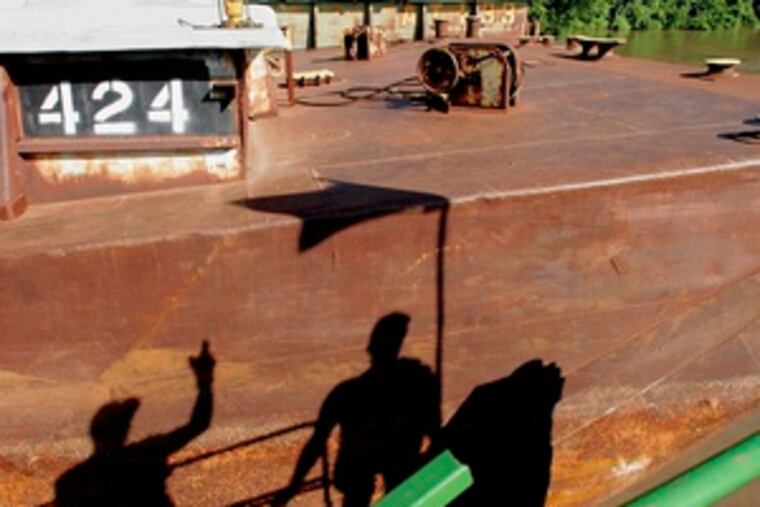Barge traffic grounded by flooding
WINFIELD, Mo. - This month's flooding in the Midwest has brought freight traffic on the upper Mississippi to a standstill, stranding more than 100 barges loaded with grains, cement, scrap metal, fertilizer and other products as shippers wait for the water to drop.

WINFIELD, Mo. - This month's flooding in the Midwest has brought freight traffic on the upper Mississippi to a standstill, stranding more than 100 barges loaded with grains, cement, scrap metal, fertilizer and other products as shippers wait for the water to drop.
"We're basically experiencing total shutdown," said Larry Daily, president of Alter Barge Line Inc. of Bettendorf, Iowa.
While the bottleneck is costing him and other barge operators tens of thousands of dollars in lost revenue per day, June is a slow shipping period on the river compared with the late-summer harvest. The shutdown is expected to last only a few weeks, and it involves primarily non-perishable goods. So no major long-term damage to the economy is expected.
Still, there could be temporary shortages of some products. Among the freight being held up: corn and soybeans headed downstream for New Orleans, where grain is loaded onto ships for export. Construction supplies and petroleum products headed upstream on the Mississippi are not getting through, either.
Because of the high water, the Army Corps of Engineers has kept nine locks along the upper Mississippi closed since June 12. That has stopped all traffic through the locks along a 225-mile stretch between Illinois City, Ill., and Winfield, Mo., northwest of St. Louis.
The locks use huge electric motors to open and close gates and valves, floating the barges up and down to different levels as they make their way up and down the river. When the river floods, the Corps removes the motors to protect them from the water. When the locks shut down, barges can still move between them, but no farther.
Typically, a towboat pushes as many as 15 barges, each 12 feet high and 200 feet long, lashed together with steel cable. A single barge carries the equivalent of about 55 tractor-trailers.
Last year, between June 12 and July 1, 180 tows (a "tow" is a towboat and its set of barges) carried more than 2.5 million tons of goods through now-closed Lock 25 at Winfield. During that same period, 166 tows carrying 2.3 million tons of cargo passed through Lock 19, at Keokuk, Iowa, now closed, too.
As of Thursday, eight to 10 tows were stranded or sidelined on the upper part of the Mississippi River, said Lynn Muench, senior vice president at American Waterways Operators, an industry group.
"On a typical day at this time of year, there would be 40 to 60 tows on the upper Mississippi River, and the average tow carries the equivalent of 900 semi-trucks of product," she said.
Daily, the Iowa barge operator, said that he had 100 barges and two boats stranded at places along the river with such cargo as corn, soybeans, fertilizer, cement, animal feed, scrap metal and wind turbine towers. He estimated his business was losing $25,000 a day, and said that could rise to $40,000 when two more of his boats go idle soon.